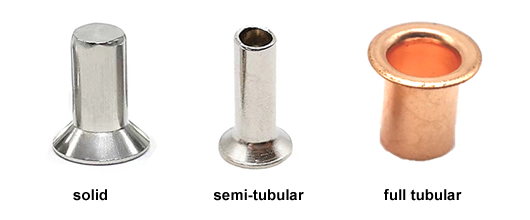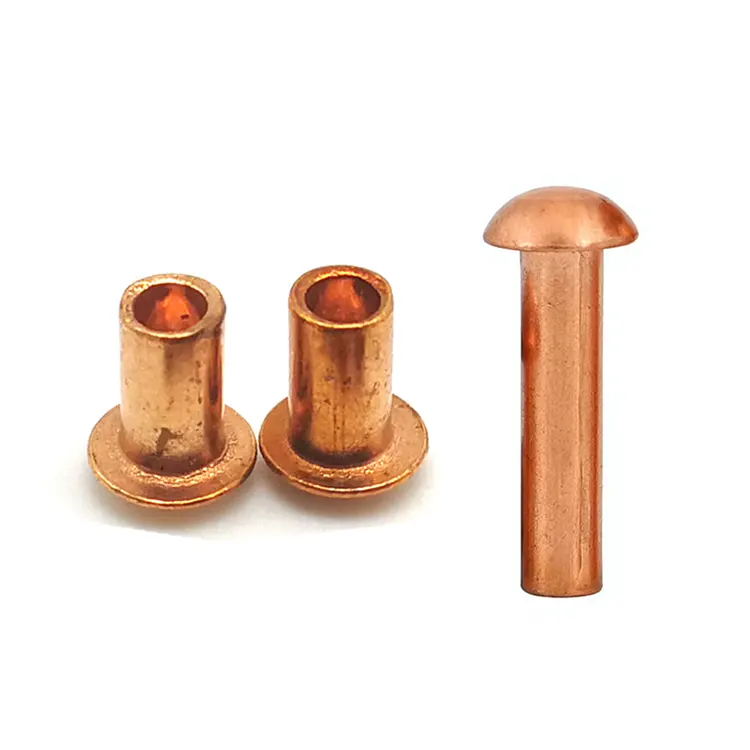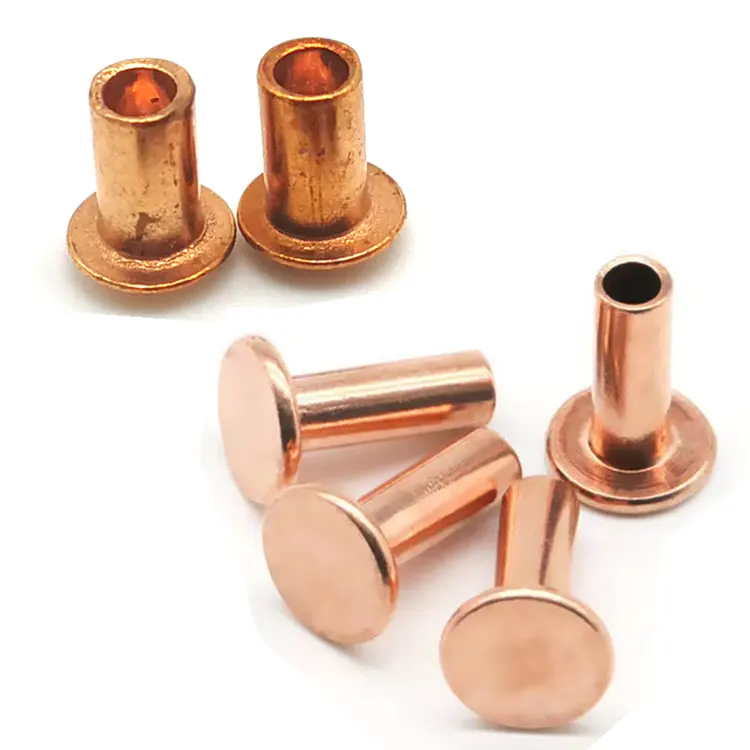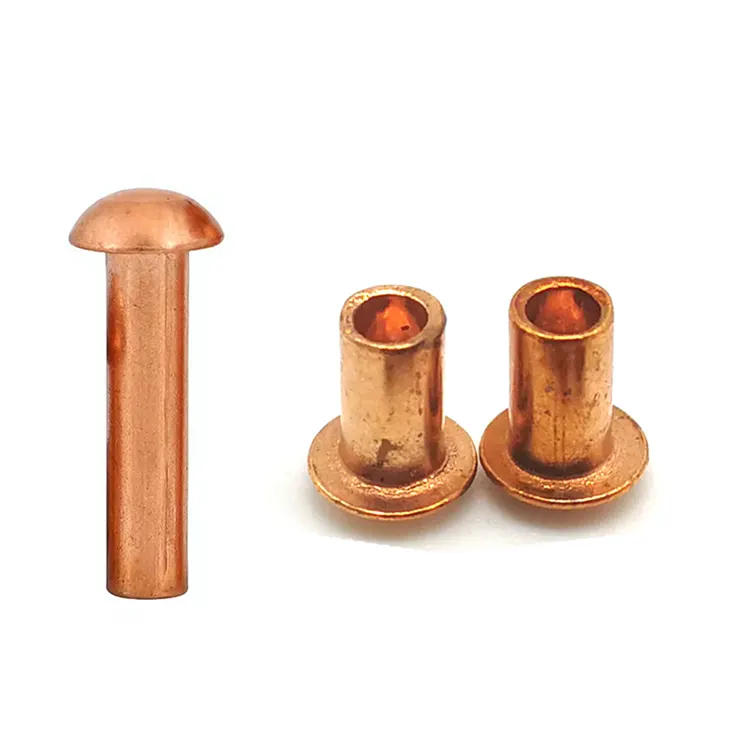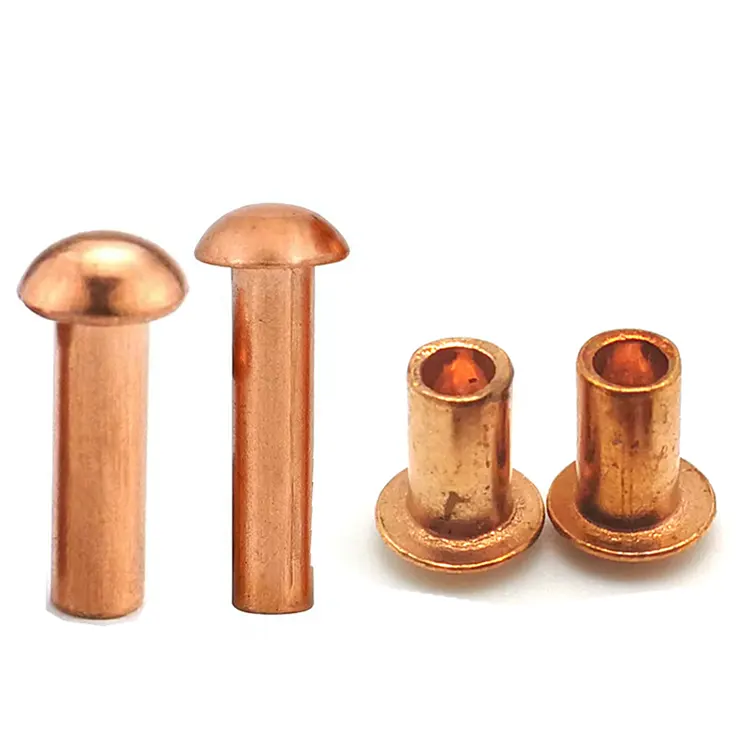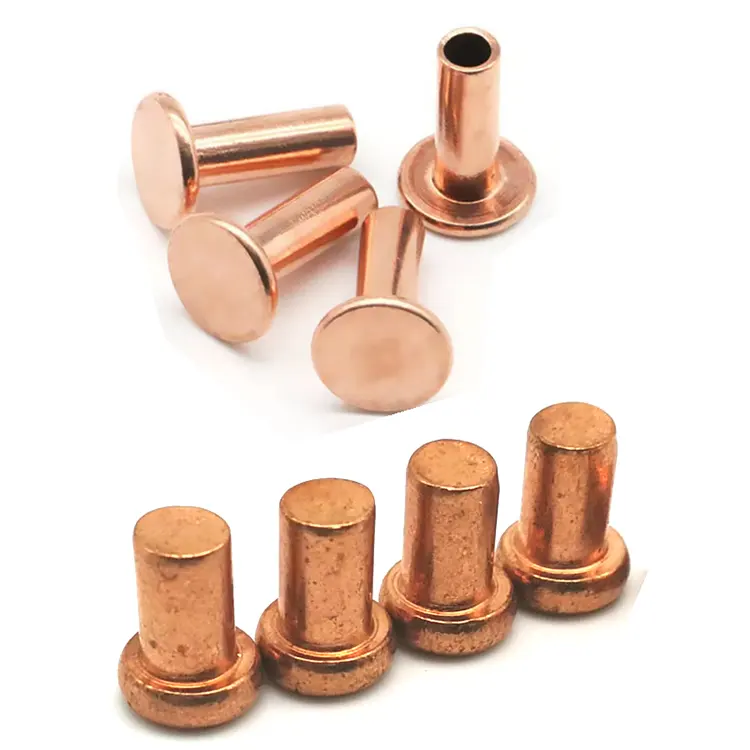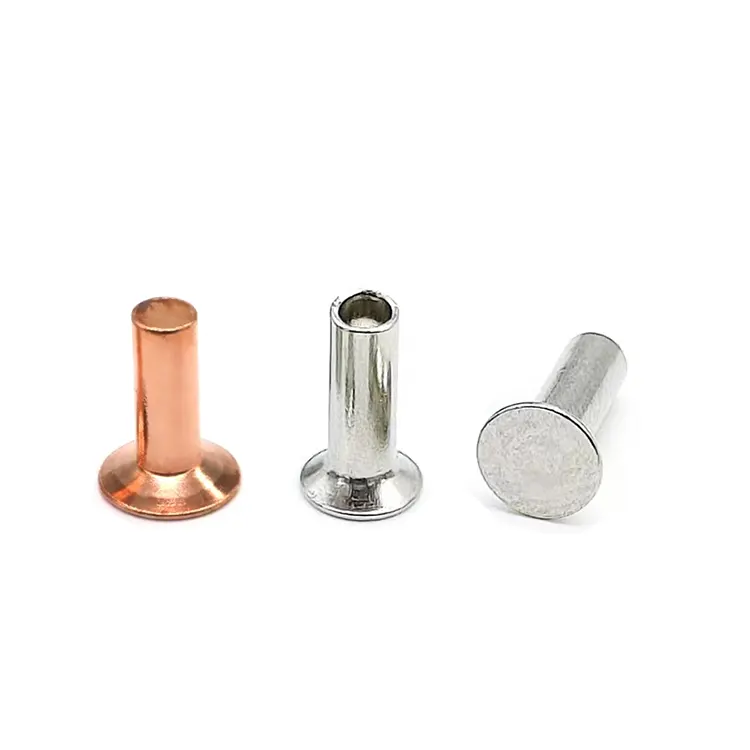Đinh tán
As one of professional manufacturer in China, Notin would like to provide you Rivets. And we will offer you the best after-sale service and timely delivery.
What is a rivet?
A rivet is a permanent mechanical fastener used to join two or more materials. Rivets work by inserting a metal pin into an aligned hole and deforming the end, creating a strong, secure, and durable connection. Unlike temporary fasteners like screws, rivets do not rely on threads, but instead form a permanent connection, making them ideal for applications requiring high strength, durability, and vibration resistance.
Classification of Rivets
Rivets are typically categorized by head shape, degree of hollowness, or material.
Based on head shape, rivets can be classified as flat head rivets, round head rivets, countersunk head rivets, mushroom head rivets, universal head rivets, truss head rivets, etc.

Based on degree of hollowness, rivets can be classified as solid rivets, semi-tubular rivets, or full tubular rivets.
Based on material, rivets can be classified as brass rivets, stainless steel rivets, steel rivets, aluminum rivets, copper rivets, etc.
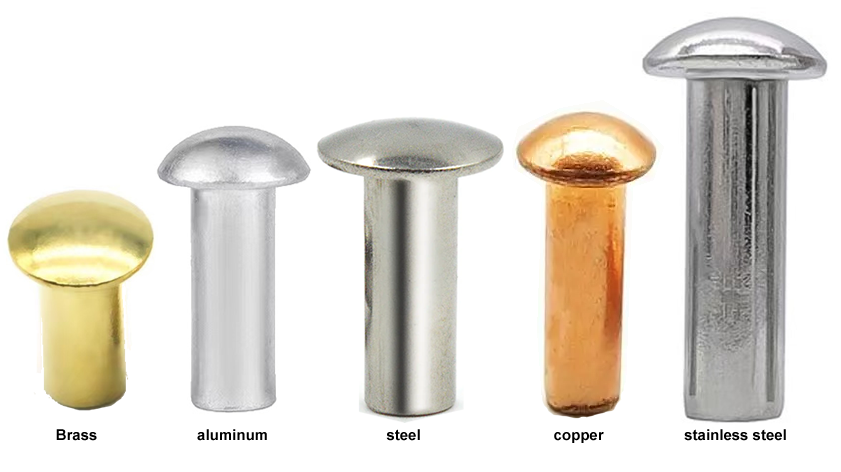
What surface finishes are available for rivets?
Rivet surfaces are typically treated with rust-proofing treatments, primarily electroplating, including zinc plating, nickel plating, chrome plating, tin plating, gold plating, and silver plating. Electroplating is a common rust-proofing method for rivets. It applies a layer of plating to the rivet surface through physical or chemical methods. The plating effectively prevents corrosion and rust, while also providing a certain aesthetic effect.
Another special surface treatment method is head coating. Head coating is performed after the rivet is electroplated. This allows for a variety of colors on the rivet head, achieving an aesthetically pleasing finish.
Aluminum rivets cannot be electroplated, but they can be anodized. Anodizing also allows for a variety of color options, but the unit price is higher than electroplating.
Rust-proofing the rivet surface is crucial, effectively extending the rivet's service life and ensuring a secure connection. Different rust-proofing methods are suitable for different environments and applications, so the choice should be tailored to the specific situation.
- View as
Đinh tán đầu tròn bằng đồng
Đinh tán đầu tròn bằng đồng là loại đinh tán được sử dụng rộng rãi trong sản xuất công nghiệp, làm đồ nội thất và các lĩnh vực khác. Đồng, còn được gọi là đồng không có oxy, là hợp kim đồng có độ tinh khiết cao được đặc trưng bởi tính dẫn điện và nhiệt tuyệt vời, cũng như khả năng chống ăn mòn và độ dẻo tốt. Những đặc tính này đảm bảo rằng đinh tán đầu tròn bằng đồng duy trì hiệu suất ổn định trong nhiều môi trường khác nhau, kéo dài tuổi thọ sử dụng của chúng. Hơn nữa, đồng có đặc tính kháng khuẩn nhất định, có thể làm giảm nguy cơ phát triển của vi khuẩn trong các sản phẩm thường xuyên tiếp xúc với cơ thể con người.
Đọc thêmGửi yêu cầuĐinh tán đồng
Nuote Metals là nhà sản xuất đinh tán chuyên nghiệp có trụ sở tại Đông Quan, Trung Quốc. Các đinh tán đồng chúng tôi sản xuất được làm từ đồng C1100. Đinh tán bằng đồng là loại dây buộc được sử dụng phổ biến. Đồng có tính dẫn nhiệt tuyệt vời nên được sử dụng rộng rãi trong các ứng dụng điện và tản nhiệt. Hơn nữa, đinh tán bằng đồng có khả năng gia công và độ dẻo tuyệt vời, cho phép chúng được sản xuất với nhiều hình dạng và kích cỡ khác nhau.
Đọc thêmGửi yêu cầuĐinh tán đầu đồng
Đinh tán đầu chảo bằng đồng có độ tinh khiết cao và mang lại độ dẫn điện tuyệt vời, khiến chúng phù hợp cho các ứng dụng yêu cầu độ dẫn điện cao. Nuote Metals chuyên sản xuất đinh tán đầu chảo bằng đồng. Chúng tôi sử dụng các loại đồng cao cấp, chẳng hạn như C1100, nhưng chúng tôi cũng có thể sản xuất các loại tùy chỉnh. Đinh tán bằng đồng của chúng tôi trải qua quá trình xử lý bề mặt đặc biệt để chống lại quá trình oxy hóa và chịu được thử nghiệm phun muối trong 48 giờ.
Đọc thêmGửi yêu cầuĐinh tán đầu nấm đồng
Đinh tán đầu nấm đồng là bộ phận cơ khí dùng để gắn chặt hai hoặc nhiều vật liệu. Chúng thường có đầu hình nấm và một thanh đặc hoặc nửa rỗng ở đầu kia. Trong quá trình lắp đặt, đầu còn lại được đập hoặc đập bằng máy tán đinh chuyên dụng khiến đầu này nở ra và tạo thành đầu còn lại rồi khớp vào đúng vị trí. Nuote Metals là chuyên gia về đinh tán đầu nấm bằng đồng. Chúng tôi cung cấp đầy đủ các thông số kỹ thuật về đinh tán và sử dụng hơn 40 máy tán đinh với nhiều kích cỡ khác nhau để đáp ứng nhu cầu của khách hàng.
Đọc thêmGửi yêu cầuĐinh tán đầu phẳng bằng đồng
Nuote Metals, đặt tại Đông Quan, Trung Quốc, là nhà sản xuất đinh tán chuyên nghiệp. Đinh tán của chúng tôi có chất lượng cao và giao hàng đảm bảo, mang lại cho họ danh tiếng thuận lợi đối với khách hàng trong nước và quốc tế. Đinh tán đầu phẳng bằng đồng của chúng tôi được làm từ đồng chất lượng cao, mang lại bề mặt mịn màng, tinh tế và cảm giác ổn định, chắc chắn. Thiết kế đầu phẳng của chúng không chỉ làm tăng diện tích tiếp xúc mà còn phân tán áp lực một cách hiệu quả, đảm bảo kết nối ổn định hơn.
Đọc thêmGửi yêu cầuĐinh tán đầu chìm bằng đồng
Đinh tán đầu chìm bằng đồng do Nuote Metals sản xuất tại Trung Quốc là ốc vít kim loại phổ biến được sử dụng chủ yếu trong sản xuất máy móc, thiết bị điện tử, lắp ráp đồ nội thất và các lĩnh vực công nghiệp khác. Là một vật liệu kim loại truyền thống, đồng có tính dẫn điện, nhiệt và chống ăn mòn tuyệt vời, khiến nó trở nên phổ biến trong các ứng dụng cụ thể. Đinh tán đầu chìm là ốc vít được sản xuất thông qua quá trình rèn nguội hoặc rèn nóng. Cấu trúc đơn giản của chúng đòi hỏi các công cụ tán đinh để tạo ra một kết nối chuyên dụng.
Đọc thêmGửi yêu cầuWhat are the advantages of rivets over other fasteners?
1. Ease of Installation
Rivets are fast to install, and even fully automated for high-volume applications, resulting in a simple and efficient operation process.
2. Connection Reliability
The riveting process is standardized, with strict quality control, resulting in highly stable connections. Visual inspection allows for quick verification of connection quality.
3. Vibration and Impact Resistance
Rivets connect through deformation or interference fit, providing strong clamping force and excellent vibration resistance, capable of withstanding vibration and shock.
4. Low Cost
Rivets are easy to install and can be fully automated, saving significant labor costs.
What are the advantages and disadvantages of rivets made of different materials?
Aluminum Rivets
Advantages: Lightweight, reduces overall product weight, low cost, suitable for general civilian applications.
Disadvantages: Low tensile and shear strength, unsuitable for high-strength workpieces, prone to electrochemical corrosion when in contact with metals such as stainless steel.
Stainless Steel Rivets
Advantages: Strong corrosion resistance, high hardness, suitable for high-strength workpieces (such as marine equipment)
Disadvantages: Higher cost, typically more expensive than aluminum rivets of the same specification.
Brass and Copper Rivets
Advantages: Excellent conductivity (such as connecting electronic components), good corrosion resistance.
Disadvantages: Higher cost, more difficult to process.
Steel Rivets
Advantages: High hardness, high connection reliability, and wide applicability.
Disadvantages: Compared to other materials, iron rivets are more prone to rusting.
What are the main applications of rivets?
Rivets have a wide range of uses, from small items like a pair of scissors to large items like airplanes and ships, as well as in high-precision medical applications.
Industrial Manufacturing
Rivets are used in a wide variety of industrial fields, wherever there is a need to connect two or more materials.
Electronics
Rivets secure heat sinks and chips, providing both vibration damping and noise reduction, and are widely used in the cooling systems of electronic products such as computers and mobile phones.
Automotive
Rivets are widely used to connect components of automobile bodies and chassis, such as doors and hoods. Their lightweight and corrosion-resistant properties make them an indispensable joining method in automotive manufacturing.
Aerospace
In aircraft manufacturing, rivets are used to connect different fuselage components, such as wings and tailplanes. Millions of rivets create high-strength, corrosion-resistant joints. Aluminum and titanium alloy rivets are often used to connect components of corresponding materials, ensuring stability in extreme environments.
Rivets are used everywhere. The above examples only represent a small number of their applications. We see rivets everywhere in our daily lives, such as on scissors, folding beds, and strollers etc. Rivets can be customized to different sizes and materials depending on the application.
Nuote Metals has specialized in the rivet industry for over a decade. Our factory is located in Dongguan, a city known as the "World Factory," a city with a developed industry and convenient transportation. This allows us to respond quickly when acquiring raw materials and supporting surface treatments, meeting our customers' needs for quick access to samples and bulk orders. We produce 10 million rivets daily and have molds of various specifications, allowing us to produce rivets as small as 0.8mm and as large as 10mm. We welcome your inquiries and visits.






